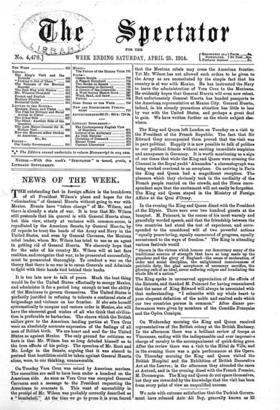In the evening the King and Queen dined with the
President at the Elysee. There were over two hundred guests at the banquet. M. Poineare, in the course of his most warmly and gracefully worded speech, said that the friendship between the two countries had stood the teat of experience, and corre- sponded to the considered will of two powerful nations " equally peace-loving, equally enamoured of progress, equally accustomed to the ways of freedom." The King in attending various festivals would
"discern in the virtues which honour our democracy many of the traditional sources of strength that have so long made up the grandeur and the glory of England—the sense of moderation, of order and social discipline, the enlightened consciousness of patriotic duty, the glad acceptance of necessary sacrifice, the glowing cult of an ideal, never suffering eclipse and irradiating the whole life of a nation."
The King spoke in unreserved appreciation of the effects of the Entente, and thanked M. Poincare for having remembered that the name of King Edward will always be associated with that understanding. "I subscribe with my whole heart to your eloquent definition of the noble and exalted ends which our two countries pursue in common." After dinner per- formances were given by members of the Comedic Francais' e and the Opera Comique.


























































 Previous page
Previous page